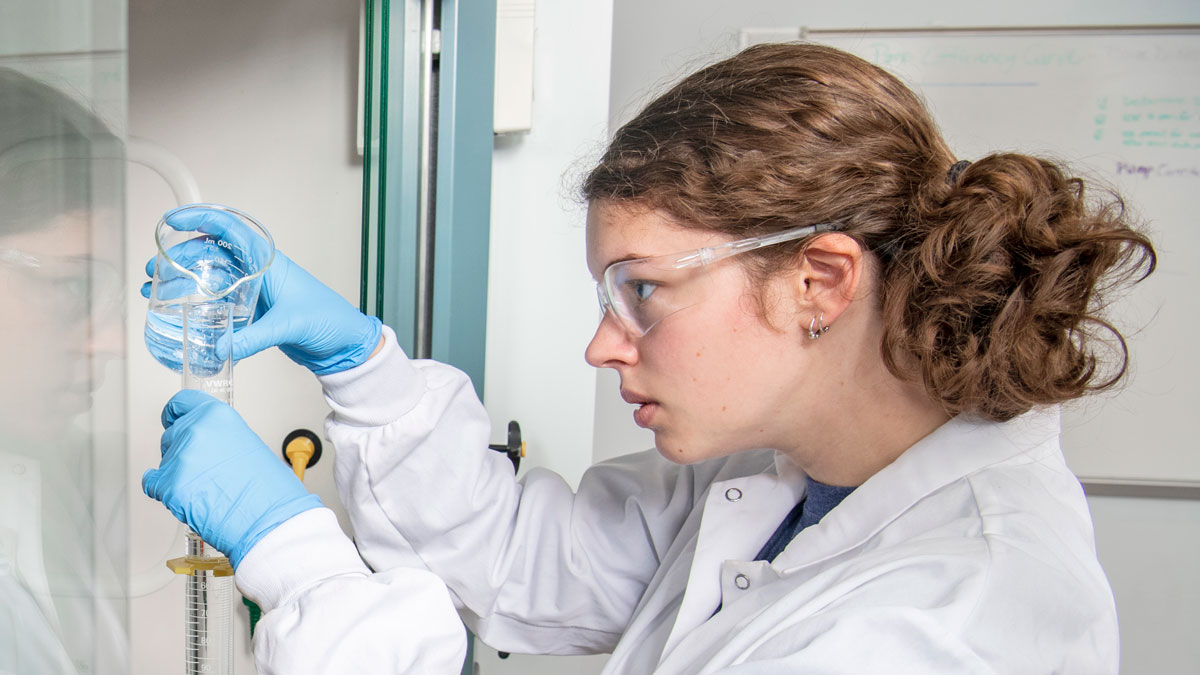Chemical Engineering Master of Science Degree

Chemical Engineering
Master of Science Degree
- RIT /
- College of Engineering /
- Academics /
- Chemical Engineering MS
The chemical engineering MS prepares you to develop new, high-tech materials for use across a range of industries ranging from semiconductors to pharmaceuticals.
Overview for Chemical Engineering MS
Why Pursue a Master’s in Chemical Engineering
STEM-OPT Visa Eligible: The STEM Optional Practical Training (OPT) program allows full-time, on-campus international students on an F-1 student visa to stay and work in the U.S. for up to three years after graduation.
Advanced Course Work with Capstone Project: Chemical engineering MS students receive training in latest theory, principles, and processes to design engineered systems culminating in an independent project.
Hands-On Experience: Students may pursue research for credit with a faculty member, graduate internships, and cooperative education through paid full-time work in industry.
Strong Career Paths: Students are hired at industry-leading companies, such as Bausch & Lomb, Boston Beer Company, Regeneron, DuPont, Eastman Kodak Company, Global Tungsten and Powders, Northrop Grumman, Global Foundries, The Hershey Company, and more.
Chemical engineers apply the core scientific disciplines (chemistry, physics, biology, and mathematics) to transform raw materials or chemicals into more useful or valuable forms, invariably in processes that involve chemical change. In research and development, chemical engineers not only create new, more effective ways to manufacture chemicals but also work collaboratively with chemists to pioneer the development of new high-tech materials for specialized applications. The development, commercialization, and optimization of the industrial-scale processes for manufacturing chemicals and advanced materials are feats of chemical engineering. Virtually every aspect of a modern industrial economy is critically dependent upon chemical engineering for manufacturing the vast array of bulk and specialty chemicals and high-tech materials needed to create a limitless array of value-added products.
Those with advanced knowledge in chemical engineering become leaders in industry, government, and higher education.
RIT’s Chemical Engineering MS Degree
In RIT’s chemical engineering MS, you will take core chemical engineering courses in topics like advanced engineering mathematics, advanced thermodynamics, transport phenomena, and advanced reaction engineering. With this foundation in place, you are prepared to select focus area elective courses that provide a breadth of expertise across chemical engineering and develop your professional interests. You may personalize your master’s in chemical engineering with elective courses in chemical engineering, mechanical engineering, microelectronic engineering, microsystems engineering, imaging science, materials science and engineering, and mathematics. These areas give you an opportunity to customize your course work in a range of topics, such as:
- Battery engineering
- Renewable energy systems
- Nanotechnology and microsystems
- Quantum mechanics
- Polymer science
- Thermodynamics
- Applied mathematics
-
Affordable Now. Valuable for Life.
Earn your master’s degree without the full price tag. With Master Up you can receive a 30% tuition scholarship for an RIT master’s degree.
-
Join us for Fall 2026
Many programs accept applications on a rolling, space-available basis.
Featured Work and Profiles
-
RIT Research Minute: Ethylene from Methane Feedstock
Obioma Uche RIT Assistant Professor, Dr. Obioma Uche is researching how to produce ethylene from methane feedstock with the goal of creating environmental and economic benefits. Learn more about what she and her...
Read More about RIT Research Minute: Ethylene from Methane Feedstock -
RIT Research Minute: Soft Matter Signaling
Jairo Diaz Amaya Professor Jairo Diaz and his research team are experimenting with soft matter to create new materials for the future. Learn how they’re changing the internal structure of tiny microscopic droplets to...
Read More about RIT Research Minute: Soft Matter Signaling -
RIT Researchers Ranked Among Stanford’s Top 2% Scientists
Dozens of RIT researchers were named among the world’s top 2% of scientists in a Stanford University study, recognizing their significant contributions to their fields.
Read More about RIT Researchers Ranked Among Stanford’s Top 2% Scientists -
RIT Chemist Awarded Grant to Unravel the Secrets of Molecular 'Handedness'"
Poornima Padmanabhan RIT’s Poornima Padmanabhan is set to investigate how the twist in molecules—like how your left hand differs from your right—plays a crucial role in biology and material innovation.
Read More about RIT Chemist Awarded Grant to Unravel the Secrets of Molecular 'Handedness'"
Curriculum for 2025-2026 for Chemical Engineering MS
Current Students: See Curriculum Requirements
Admissions and Financial Aid
This program is available on-campus only.
| Offered | Admit Term(s) | Application Deadline | STEM Designated |
|---|---|---|---|
| Full‑time | Fall; Spring may be considered | February 15 priority deadline; rolling thereafter | Yes |
| Part‑time | Fall; Spring may be considered | February 15 priority deadline; rolling thereafter | No |
Full-time study is 9+ semester credit hours. Part-time study is 1‑8 semester credit hours. International students requiring a visa to study at the RIT Rochester campus must study full‑time.
Application Details
To be considered for admission to the Chemical Engineering MS program, candidates must fulfill the following requirements:
- Complete an online graduate application.
- Submit copies of official transcript(s) (in English) of all previously completed undergraduate and graduate course work, including any transfer credit earned.
- Hold a baccalaureate degree (or US equivalent) from an accredited university or college in chemical engineering, or a related field with successful completion of courses in engineering thermodynamics, multi-variable calculus, differential equations, fluid mechanics, and reaction engineering. A minimum cumulative GPA of 3.0 (or equivalent) is recommended.
- Submit a current resume or curriculum vitae.
- Submit a personal statement of educational objectives.
- Submit two letters of recommendation.
- Entrance exam requirements: GRE optional but recommended
- Submit English language test scores (TOEFL, IELTS, PTE Academic, etc.), if required. Details are below.
English Language Test Scores
International applicants whose native language is not English must submit one of the following official English language test scores. Some international applicants may be considered for an English test requirement waiver.
Duolingo (DET): 130
IELTS: 6.5
LanguageCert Academic: 74
PTE Academic: 60
TOEFL: 88/4.5
International students below the minimum requirement may be considered for conditional admission. Deaf and hard-of-hearing test takers with significant hearing loss do not need to take the listening and speaking sections for the TOEFL and IELTS. Each program requires balanced sub-scores when determining an applicant’s need for additional English language courses.
How to Apply Start or Manage Your Application
Cost and Financial Aid
An RIT graduate degree is an investment with lifelong returns. Graduate tuition varies by degree, the number of credits taken per semester, and delivery method. View the general cost of attendance or estimate the cost of your graduate degree.
A combination of sources can help fund your graduate degree. Learn how to fund your degree
Accreditation
Research
The faculty and students in the Kate Gleason College of Engineering are engaging in numerous areas of research, which takes place across all of our engineering disciplines and often involves other colleges at RIT, local health care institutions, and major industry partners. Explore the college's key research initiatives to learn more about our research in:
Related News
-
February 20, 2025

Engineering faculty receives DARPA Young Faculty Award honors
Jairo Diaz Amaya, assistant professor of chemical engineering was honored with a Defense Advanced Research Projects Agency (DARPA) Young Faculty Award for his work conducting fundamental research in the fabrication and self-assembly of colloids—key elements of soft matter.
-
January 30, 2025

Research collaboration between RIT and Cornell produces new technique to enhance sensors and photonic devices
Researchers have discovered new ways to bend light to improve optical applications such as sensors, displays, and next-generation photonic devices.
-
August 27, 2024

RIT offers new master’s degrees in chemical engineering, biomedical engineering, and project management
The new engineering master’s degrees will serve to meet demands in increasing renewable energies, personalized healthcare technologies, and diagnostic system improvements. The project management MS allows students the ability to better specialize to their specific interests, giving them a competitive edge in their field of interest and making them more valuable to an employer.
Contact
- Lindsay Lewis
- Senior Assistant Director
- Graduate Admissions
- Enrollment Management
- 585‑475‑5532
- lslges@rit.edu
- Patricia Taboada-Serrano
- Graduate Program Director, Chemical Engineering
- Department of Chemical Engineering
- Kate Gleason College of Engineering
- 585‑475‑7337
- ptsche@rit.edu
Department of Chemical Engineering










